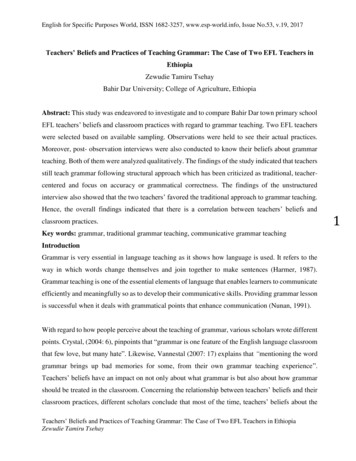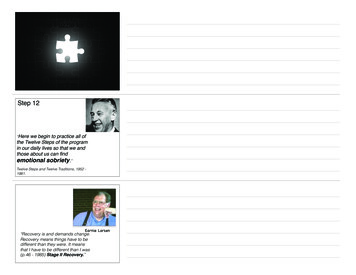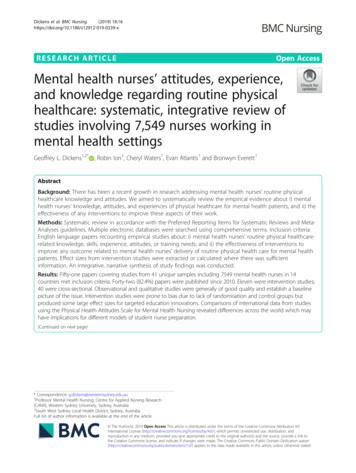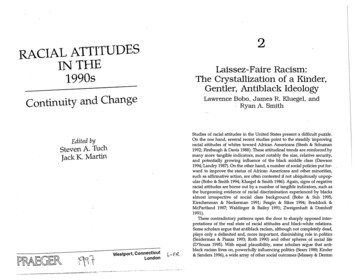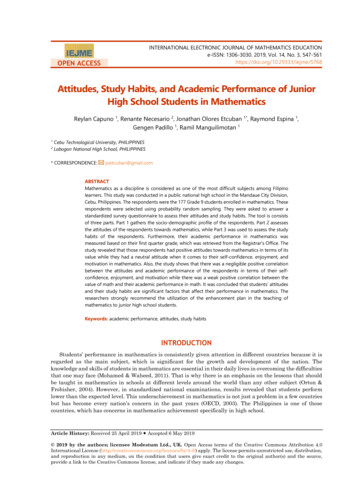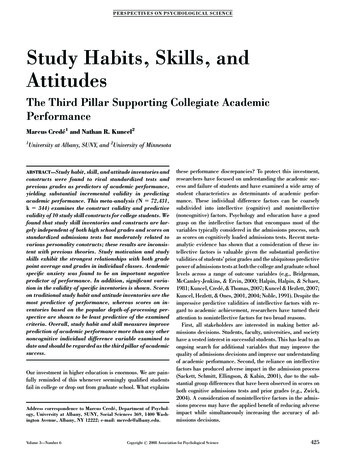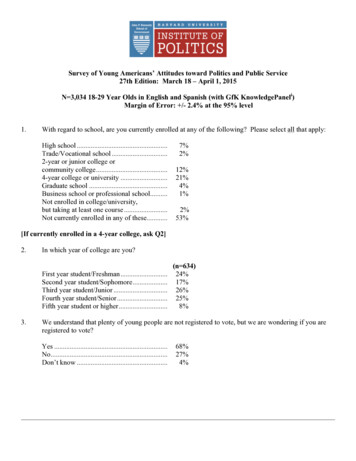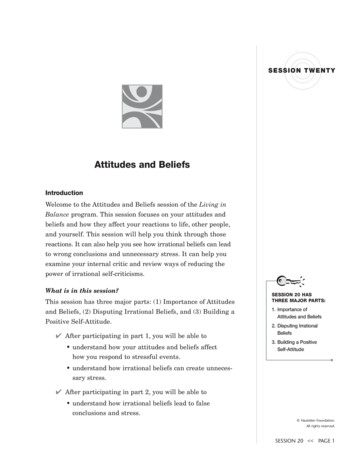
Transcription
SESSION TWENTYAttitudes and BeliefsIntroductionWelcome to the Attitudes and Beliefs session of the Living inBalance program. This session focuses on your attitudes andbeliefs and how they affect your reactions to life, other people,and yourself. This session will help you think through thosereactions. It can also help you see how irrational beliefs can leadto wrong conclusions and unnecessary stress. It can help youexamine your internal critic and review ways of reducing thepower of irrational self-criticisms.What is in this session?This session has three major parts: (1) Importance of Attitudesand Beliefs, (2) Disputing Irrational Beliefs, and (3) Building aPositive Self-Attitude. After participating in part 1, you will be able to understand how your attitudes and beliefs affecthow you respond to stressful events.SESSION 20 HASTHREE MAJOR PARTS:1. Importance ofAttitudes and Beliefs2. Disputing IrrationalBeliefs3. Building a PositiveSelf-Attitude understand how irrational beliefs can create unnecessary stress. After participating in part 2, you will be able to understand how irrational beliefs lead to falseconclusions and stress. Hazelden Foundation.All rights reserved.SESSION 20 PAGE 1
LIVING IN BALANCE look at an event in your own life that causedyou stress and see how you could have disputed theirrational beliefs that caused you stress. After participating in part 3, you will be able to understand that you have an illogical internal critic. learn how to challenge illogical internal criticism. focus on your strengths. accept things you cannot change.What will be asked of you?You will be asked to look at how attitudes and beliefs, especiallyirrational ones, can cause unnecessary stress. Doing so may besomewhat challenging, because you must confront the way inwhich your own thinking makes potential problems seem worseand more stressful. However, if you have the courage to look atyour attitudes and beliefs, you will learn to dispute irrationalbeliefs and avoid one of the common causes of relapse.LEARNER OBJECTIVESFOR PART 1:You will understand how yourattitudes and beliefsaffect how you respondto stressful events. understand how irrationalbeliefs can create unnecessary stress.Part 1: Importance of Attitudesand BeliefsAttitudes and beliefs have a strong effect on how you understandthings that happen to you. There is an old saying that a personmay see a glass as half full or half empty. The person who is worried about the glass being half empty may experience more stressthan the person who sees it as half full. Attitudes and perceptions can affect how you feel.DEFINITION OFSTRESSORS:Those people, places,events, rules, regulations,expectations, or requeststhat put some kind ofdemand on people. Hazelden Foundation.All rights reserved.PAGE 2 SESSION 20Stress and StressorsEvery stressful situation has two major parts: the stress and thestressors. Stressors are those people, places, events, rules, regulations, expectations, or requests that put some kind of demandon people. Stress is the internal reaction to those demands.
ATTITUDES AND BELIEFSEXERCISE 1Please answer the following question:In your own words, how would you describe or define stressand stressor?An individual’s attitudes and beliefs about an event and thoseinvolved determine whether a stressor will create stress. Whatmay be a stressor for one person may not be for someone else.For the most part, all people react in their own way and basedon their background and personality.For example, Vanessa and Joan were both ordered by a judgeto attend Narcotics Anonymous meetings for one year. The judge’sorder could be considered a stressor.An individual’s attitudesand beliefs about anevent and those involveddetermine whether astressor will create stress.Vanessa does not believe that she has a problem with drugs.She does not want to stop using and doesn’t want any help. Shedoesn’t want to attend Narcotics Anonymous meetings. Vanessa’sinternal reaction to the judge’s order is anger and stress. She willgo to the meetings but hate them, finding them stressful.On the other hand, Joan believes that she has a problem withdrugs and really wants to quit using. She has tried to quit beforeand wants to do it right this time. Joan’s internal reaction to thejudge’s order to attend Narcotics Anonymous is one of relief,because she wants to get sober and thinks that this will help.In this example, the potential stressor was the judge’s orderfor Vanessa and Joan to attend Narcotics Anonymous meetings.However, Vanessa experienced stress, while Joan did not. Hazelden Foundation.All rights reserved.SESSION 20 PAGE 3
LIVING IN BALANCEA three-step process. To a large degree, it is not events thatcause stress or other feelings, but rather people’s beliefs aboutthose events. It may help to look at stressful events as a threestep process:1. The stressor event2. Beliefs3. Emotional consequencesFor example, the judge’s order was a stressor (1). Vanessa hadthe belief (2) that attending the Narcotics Anonymous meetingswould be a waste of time. The emotional consequences (3) werestress and anger.EXERCISE 2Please check the answer that seems most true:1. Did Vanessa and Joan have to deal with the same potentialstressor? Yes No2. What was Joan’s internal reaction to the judge’s order? Anger Relief Fear Tiredness3. What was Vanessa’s internal reaction to the judge’s order? Hazelden Foundation.All rights reserved.PAGE 4 SESSION 20 Anger Relief Fear Tiredness
ATTITUDES AND BELIEFSBeliefsVanessa and Joan were both faced with the same potentialstressor: the judge’s order to attend Narcotics Anonymous for oneyear. Because Joan felt that Narcotics Anonymous would do hersome good, she did not react with stress to the judge’s order. Shedid not find the idea of going to Narcotics Anonymous stressful.However, because Vanessa felt that she didn’t have a problemand didn’t want to go to Narcotics Anonymous, she reacted withboth anger and stress to the judge’s order. When she went toNarcotics Anonymous, she hated it.Despite facing the same potential stressor, Vanessa felt stress,What a person believesbut Joan did not. The difference between Vanessa and Joan washas a tremendoustheir beliefs. In other words, Vanessa hates Narcotics Anonymousimpact upon what hewhile Joan enjoys Narcotics Anonymous because they haveor she feels.different beliefs about whether they have a problem with drugs,whether they need help with that problem, and whether NarcoticsAnonymous can help them. In this case, what a person believeshas a tremendous impact upon what he or she feels.EXERCISE 3Please answer the following question:Name an event that you found stressful. How might you havefelt about it if you’d had other attitudes and beliefs about thesituation? Hazelden Foundation.All rights reserved.SESSION 20 PAGE 5
LIVING IN BALANCEIrrational BeliefsObviously, people have different experiences and thereforedifferent beliefs. Importantly, people have very different beliefsabout themselves. Some of these beliefs are rational and true.On the other hand, some of these beliefs are irrational and selfdefeating, causing stress, anxiety, anger, guilt, and depression.Irrational thinking is associated with the words should, ought,must, always, and never. For example, consider each of the following statements and respond to the questions that follow.EXERCISE 4Read the following statement, and then answer the questions:“I should be able to understand this information better.I must be stupid.”1. Why is this statement irrational?2. What are some rational reasons for not being able toIrrational thinking isassociated with the wordsunderstand the information?should, ought, must,always, and never. Hazelden Foundation.All rights reserved.PAGE 6 SESSION 20
ATTITUDES AND BELIEFS3. If someone doesn’t understand something, is he or shestupid? Yes NoWhy or why not?EXERCISE 5Read the following statement, and then answer the questions:“I ought to be able to have complete control over myemotions. I must be a weak person.”1. Why is this statement irrational?2. What are some rational reasons for not having completecontrol over emotions? Hazelden Foundation.All rights reserved.SESSION 20 PAGE 7
LIVING IN BALANCE3. If someone doesn’t have complete control over his or heremotions, does that mean he or she is a weak person? Yes NoWhy or why not?EXERCISE 6Read the following statement, and then answer the questions:“I feel terrible. I got in an argument with someone atan NA meeting. I must learn to agree with everyone.Otherwise, people will reject me.”1. Why is this statement irrational?2. Can everyone learn to agree with everyone else? Yes NoWhy or why not? Hazelden Foundation.All rights reserved.PAGE 8 SESSION 20
ATTITUDES AND BELIEFS3. Will people reject a person simply because they disagreewith him or her? Yes NoWhy or why not?EXERCISE 7Read the following statement, and then answer the questions:“This treatment stuff is interesting, but it won’t workfor me. I don’t think I can change or do things differently.I have always done it this way.”1. Why is this statement irrational?2. Does anyone always have to do something the same way? Yes No( Please explain your answer.) Hazelden Foundation.All rights reserved.SESSION 20 PAGE 9
LIVING IN BALANCEEXERCISE 8Read the following statement, and then answer the questions:“I am so embarrassed for leaving my work at home. I neverdo anything right. I’m just not ready for treatment.”1. Why is this statement irrational?2. Does anyone never do anything right? Yes No( Please explain your answer.)3. Does this incident really mean the person is not readyfor treatment? Yes NoWhy or why not? Hazelden Foundation.All rights reserved.PAGE 10 SESSION 20
ATTITUDES AND BELIEFSPart 2: Disputing Irrational BeliefsAs noted before, stress, anger, guilt, and anxiety often comefrom people’s beliefs about certain events. These beliefs are oftenirrational.To stop irrational beliefs from causing stress and anxiety,you must understand that they are irrational or wrong. By disputing and challenging irrational beliefs, you can replacestressful emotional consequences with different, less stressfulfeelings and responses.Consider the following example of disputing irrational beliefs:Joe was actively addicted to drugs for more than tenLEARNER OBJECTIVESFOR PART 2:You will understand how irrationalbeliefs lead to falseconclusions and stress. look at an event in yourown life that caused youstress and see how youcould have disputed theirrational beliefs thatcaused you stress.years. He made several unsuccessful attempts at quitting. His wife, Darlene, pushed him to quit many times.When he was using, they had frequent arguments abouthis drug use. Joe is now in a drug treatment programand has been drug free for sixty days. Darlene recentlystarted going to Nar-Anon and is seeing a therapist.When Darlene told Joe that she was going to a therapistand to Nar-Anon meetings, Joe became very angry anddepressed. He felt guilty because he felt that she wasdoing this because of him. He believed that if she wentto Nar-Anon meetings and therapy, she would get betterand leave him. He also felt that because he had hurther when he was using, he was worthless and probablydidn’t deserve her love.Joe finally had the courage to admit his true feelings toDarlene. She told Joe that she went to therapy and toNar-Anon for her own mental health, not because shewanted to leave him. Hazelden Foundation.All rights reserved.SESSION 20 PAGE 11
LIVING IN BALANCEEXERCISE 9Please answer the following questions, which are based on the example:1. What were Joe’s stressors?2. What were Joe’s irrational beliefs?3. How did Joe feel as a result of his beliefs about thesituation with his wife? Hazelden Foundation.All rights reserved.PAGE 12 SESSION 20
ATTITUDES AND BELIEFS4. How could Joe realize that his beliefs are irrational?5. If Joe had had different beliefs about what his wife wasdoing, how might his feelings have been different?Disputing Your Own Irrational BeliefsTo practice what you’ve learned in this session, try thinkingabout a recent problem that caused you unnecessary stressbecause of an irrational belief. Using what you know now aboutthe event, answer the questions.E X E R C I S E 10Please answer the following questions:1. What was the stressor or event? What happened? Hazelden Foundation.All rights reserved.SESSION 20 PAGE 13
LIVING IN BALANCE2. What did you believe about the situation?3. How did you feel because of this event?4. How could you have disputed or argued against this irrational belief with yourself?5. What would be the less stressful feeling you would haveif you believed differently? Hazelden Foundation.All rights reserved.PAGE 14 SESSION 20
ATTITUDES AND BELIEFSPart 3: Building a Positive Self-AttitudeAddiction affects your attitudes and beliefs in serious and negativeways. The drive for alcohol or other drugs made you say, do,and think things that you wouldn’t ordinarily. Now that you arein treatment and early recovery, you may become even moreaware of the ways in which you have hurt yourself and others.This awareness can make you feel bad about yourself.LEARNER OBJECTIVESFOR PART 3:You willBut the reality is that right now, by working through thissession, you are doing something good for yourself and others.Treatment is a powerful step toward emotional health. Duringthis time, you can start working on your self-esteem. understand that you havean illogical internal critic. learn how to challengeillogical internal criticism. focus on your strengths.We have what can be called an internal critic. Your internalcritic judges you harshly. Your internal critic may tell you that accept things you cannotchange.you are inferior, self-centered, unattractive, unworthy of love, orhopeless. The internal critic is an irrational part of your life. Theinternal critic can lower your self-esteem. But you also have arational side. Fortunately, your rational side can confront yourirrational internal critic. Doing so can help to increase your selfesteem. This section will show you how.Understand Your Internal CriticYour irrational internal critic can be harsh and mean or blameyou when things go poorly. Your internal critic may tell you thatyou always cause problems and that you are not good enough orYour internal criticsmart enough. Your internal critic may tell you that you willjudges you harshly.never get better or make it through treatment.As mean and irrational as these self-criticisms can be, theyprovide a form of self-protection. It may sound strange, but theseirrational self-criticisms are ways in which you unconsciouslytry to protect yourself. The problem is that they don’t work thatwell, and they hurt you. As a first step, it can be useful to tryto understand the meaning behind irrational self-criticisms. Hazelden Foundation.All rights reserved.SESSION 20 PAGE 15
LIVING IN BALANCEInternal critic dialoguePurposeYou can’t do it.Helps you avoid challengesYou are stupid.Just keep quiet.Helps you avoidembarrassmentShe won’t help you.Give up.Helps you avoiddisappointmentYou are going to fail.Helps you seek sympathyE X E R C I S E 11Please answer the following questions:1. Name three of your most common irrational self-criticisms.2. In what ways do these irrational self-criticismsprotect you? Hazelden Foundation.All rights reserved.PAGE 16 SESSION 20
ATTITUDES AND BELIEFS3. In what ways do these irrational self-criticisms hurt you?Challenge Your Internal CriticThere is a difference between self-criticism and irrationalself-criticism. It is normal and healthy to identify somethingthat you could do better. For instance, if you were mean to aco-worker, it would be healthy to criticize yourself. That couldhelp you to stop being mean. But if your self-criticism was, “Younever do anything right,” that would be irrational, unhealthy,and destructive.So what do you do? A good step is to examine whether yourself-criticisms are true or irrational. Most likely, they are overlyexaggerated statements. When you experience a very harsh selfcriticism, give it the following challenge test.For the purpose of illustration, consider that John had anongoing self-criticism that essentially said, “You don’t do anythingright. You are a total loser. You’re not going to make it throughExamine whether yourself-criticisms are trueor irrational.treatment.” To deal with this self-criticism, John applies thechallenge test: Is there any evidence that the self-criticism is true? Is there any evidence that the self-criticism is anexaggeration? Hazelden Foundation.All rights reserved.SESSION 20 PAGE 17
LIVING IN BALANCETaking one of the self-criticisms, “You don’t do anything right,”John applies the challenge test and asks himself the following:Ask yourself: Is thereany evidence that my selfcriticism is true? Is thereany evidence that my selfcriticism is an exaggeration? Is there any evidence that my self-criticism is true? No.John thinks about it and realizes that although he hasmade mistakes, it would not be true to say that he doesn’tdo anything right. He has done some things well and madesome mistakes. Just because he has made some mistakesdoesn’t mean that he doesn’t do anything right. Is there any evidence that my self-criticism is an exaggeration? Yes. John realizes that, in fact, he has done somegood things. He also realizes that he has made somemistakes. Importantly, he realizes that he doesn’t givehimself credit for the good things that he has done, butfocuses instead on the mistakes.EXERCISE 12Please answer the following questions:1. Name three of your recurring irrational self-criticisms.a.b.c.2. For the first self-criticism, explain why this self-criticismis irrational, untrue, or an exaggeration. Hazelden Foundation.All rights reserved.PAGE 18 SESSION 20
ATTITUDES AND BELIEFS3. For the second self-criticism, explain why this self-criticismis irrational, untrue, or an exaggeration.4. For the third self-criticism, explain why this self-criticismis irrational, untrue, or an exaggeration.Challenge Illogical Self-CriticismsAs is true of the general population, many people in earlyrecovery cling to some self-criticism that causes a lot of hurtand damage in their lives. You may have a self-criticism thatyou strongly and persistently hang on to. Take a few moreminutes to work through your strongest self-criticism.EXERCISE 13Please answer the following questions:1. What illogical self-criticism or idea do you strongly holdon to even though you are starting to recognize that thisidea may be the cause of some of your problems? Explain.(more writing space on next page) Hazelden Foundation.All rights reserved.SESSION 20 PAGE 19
LIVING IN BALANCE2. What’s wrong with this self-criticism? In what ways isit unrealistic, exaggerated, illogical, or unreasonable?3. In what ways does this self-criticism control you? How doesit hurt you? What are some of the negative consequences ofbelieving in this self-criticism? Hazelden Foundation.All rights reserved.PAGE 20 SESSION 20
ATTITUDES AND BELIEFS4. Does this self-criticism help you get what you want orneed, or does it hurt you?5. Do you have any proof to support this irrational self-concept? Yes No( Please explain your answer.)6. What would you say to convince another person thatthis illogical idea doesn’t make sense? Hazelden Foundation.All rights reserved.SESSION 20 PAGE 21
LIVING IN BALANCEFocus on Your StrengthsBecause addiction prompts people to do things they would notordinarily do, and because recovery prompts people to becomeaware of these behaviors, you may sometimes feel like you havemore weaknesses than strengths. But remember, the fact thatyou are in treatment right now is a sign of strength.You could use a little ego boost about now. Although simple,it’s really important. You need to remember that you have manyareas of strength. In fact, your treatment and recovery are goingto focus on strengthening your areas of strength and on developing strengths in new areas.EXERCISE 14Please answer the following questions:1. What are some of your areas of strength regardingrelationships?2. What are some of your areas of strength regarding yourpersonality?Remember that youhave many areasof strength. Hazelden Foundation.All rights reserved.PAGE 22 SESSION 20
ATTITUDES AND BELIEFS3. What are some of your areas of strength in relation toyour emotional health?4. What are some of your areas of strength in relation toyour physical health?Accept Things That Can’t Be ChangedThe Serenity Prayer states:God grant me the serenityto accept the things I cannot change,courage to change the things I can,and wisdom to know the difference.This simple prayer contains much wisdom. In relation toattitudes and beliefs, it is a reminder that life is indeed a balancingact. On one side is the importance to recognize areas where youcan and should grow. On the other side is the importance torecognize things that can’t be changed. The prayer is a remindernot to beat your head against the wall when faced with situationsthat you cannot change. Hazelden Foundation.All rights reserved.SESSION 20 PAGE 23
LIVING IN BALANCESome of the things that you cannot change will be external.These include other people and situations about which you do nothave control. These might include laws, regulations, expectations,accusations, and broken promises. Some of the things that youcannot change will be internal. These might include personallimitations, personality characteristics, psychiatric diagnoses,fears, and anxieties.For internal, personal things that cannot be changed, you havetwo tasks. First, you have to let it go. Second, you have to acceptyourself as you are.EXERCISE 15Please answer the following questions:1. Name an external thing that you cannot change. Whatthings can you do to let go of the struggle to change it?2. Name an internal thing that you cannot change. Whatthings can you do to let go of the struggle to change it? Hazelden Foundation.All rights reserved.PAGE 24 SESSION 20
ATTITUDES AND BELIEFS3. When you find yourself struggling with an internal thingyou can’t change, how can you still be good to yourself?Session 20 SummaryIn this session you have learned about the role of attitudes and beliefs in shaping your reactions to things.You have taken a look at how irrational beliefs causepeople unnecessary stress, and then applied this newknowledge to a stressful situation that you had faced.You have examined your internal critic and reviewedways of reducing the power of irrational self-criticisms. Hazelden Foundation.All rights reserved.SESSION 20 PAGE 25
Role-Play Exercise:Irrational BeliefsPreparationTwo volunteers from the group will play Latisha and Bernard.Act out the following scene:Background and SceneLatisha and Bernard have been dating for six months. Bernard has beenin recovery from cocaine and alcohol addiction for about two years. Hisrecovery program is fairly strong. He has had two slips, but both timeshe went to an Alcoholics Anonymous meeting the next day, got his whitechip, and got back on the program.Latisha has a family history of alcoholism, but she doesn’t knowmuch about alcoholism or recovery. She has never been to Al-Anon orCodependents Anonymous.Latisha and Bernard go to a party at Latisha’s friend’s house. Alcohol isserved at the party. Bernard sees his old girlfriend, Tracy, at the party,and he gets very nervous. The last time he saw Tracy, he got into a bigfight with Latisha. Bernard holds his feelings and does not tell Latishathat he feels nervous and wants to leave. To calm his nerves, he has adrink, then several, and then a severe cocaine craving. At that point, hetells Latisha that he needs to leave. They argue, but leave.The next day, Bernard realizes that he has to strengthen his recoveryprogram and deal with his inability to talk about his feelings. He decidesthat he needs to go to ninety meetings in ninety days in order to stophis slip from becoming a relapse.A few days later, Bernard returns from a meeting. Latisha is on thecouch feeling guilty and depressed. Bernard feels good about going to ameeting and being able to talk about his feelings. Latisha feels guiltybecause she thinks that she caused Bernard’s slip. She also thinks thatBernard is going to meetings every day because he wants to get awayfrom her. They are both scared in their own way. Hazelden Foundation.All rights reserved.Continued on next pagePAGE 26 SESSION 20
Irrational BeliefsContinuedSuggested Questions1. In this role-play exercise, what are Latisha’s stressors? Are they realstressors? Would it cause stress in the average person?2. In this exercise, what are Latisha’s irrational beliefs?3. What Twelve Step activity can Latisha participate in to diminish herirrational beliefs?4. In this exercise, what could Bernard say to Latisha specifically abouthis difficulty talking about his feelings during high-risk times? Hazelden Foundation.All rights reserved.SESSION 20 PAGE 27
Welcome to the Attitudes and Beliefs session of the Living in Balance program. This session focuses on your attitudes and . Some of these beliefs are rational and true. On the other hand, some of these beliefs are irrational and self-defeating, causing stress, anxiety, anger, guilt, and depression. . t

